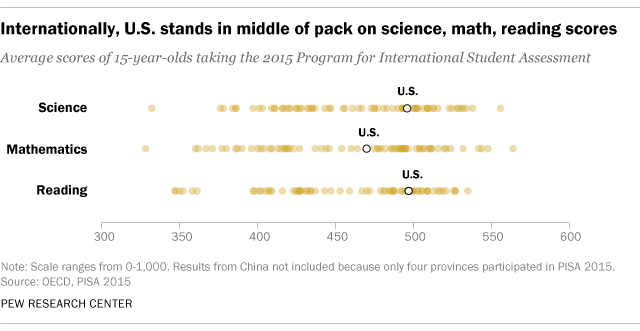The ultimate goal of school should be to strike a balance between creating culturally knowledgeable and socially conscious adults and preparing students for their future role in the workforce. The status quo school system in the United States does not adequately achieve either of those goals.
At the heart of the purpose of school is the school system’s philosophy of learning. That concept begs the question of what students are actually learning and if they are achieving their fullest potential as members of American society. New methods of learning as well as new content to learn is necessary to materialize this transformation of the classroom and the school system. As Steven Wolk indicates in his essay “Why Go To School?” “Should we be surprised that in a recent study 63% of Americans aged 18 to 24 could not find Iraq on a map, and this was after three years of war and 2,400 Americans soldiers killed?” (9). This is a problem, to say the least. If school is not even teaching students about the conflict that their nation is currently embroiled in, they are doing something seriously wrong. Schools should be teaching their students about current events in conjunction with what they are already learning. As put by Ashley McCall in “What If We Radically Reimagined the School Year?” “Mathematics: calculation of distribution for options of COVID stimulus checks. Science: inquiry about virus transmission and the role of vaccines.” These are examples of ways school could still teach traditional curriculum but apply the real world to their studies, creating a more civically engaged population. Additionally, for students to take ownership of what they are learning, they should learn in a way that interests them. To facilitate this, students should choose their own classes, increasing their focus and engagement.
While school needs to be reformed in order to increase student learning and cultural competence, it cannot become a useless experience for students in terms of preparation for their future. This is where my philosophy diverges from that of Wolk and McCall. Wolk critiques the idea of “maintaining American economic dominance” (4) determining what our schools are teaching children. Not only do I disagree with him on this front, I disagree that our schools are currently “[preparing] drones to keep the U.S. economy going” (1). Most schools in the nation do not teach a consumer education class similar to the one GBN mandates, meaning that most students in our nation don’t know how to do their taxes or invest for their retirement funds. Test scores from American students are below the global average in math.

America is the global powerhouse of the world economy and to maintain that status and increase our nation’s collective prosperity, we need to be #1 at teaching our next generation of workers. A change in the curriculum would work to remedy this, as well as greater choice of classes as students take classes about subjects that will prepare them for their preferred future profession.
Nice philosophy! I like how you incorporate the children’s future in the workforce into the need to enhance education.
LikeLike
Thank you for actually putting in the graph to further support your statistics. I’ve found it to be effective because I can truly see the impact that learning has on others.
LikeLike
Interesting take at the end, I wasn’t expecting that. Also really like the layout of your blog btw.
LikeLike
I really enjoyed how your philosophy not only enhanced the arguments made by McCall and Wolk, but sometimes you refuted their claims, which was an equally powerful message. This was a really unique philosophy in the sense that you included real world statistics, which embodied your idea of connecting students to current events. Great job!
LikeLike
So you speak directly to student choice and the impact it has on student learning (obviously). What I’m left to wonder about is what does that mean for the courses being offered by schools. You note that GBN has a Consumer Ed class. I haven’t researched whether other schools have this or what the value is for a class like this in the long run – but it left me wondering about what other courses would be ones that would help “to strike a balance between creating culturally knowledgeable and socially conscious adults and preparing students for their future role in the workforce.” What does an education like that look like? At GBN? Across the country? Elsewhere? We don’t do well on the PISA test – why do other countries?
LikeLiked by 1 person